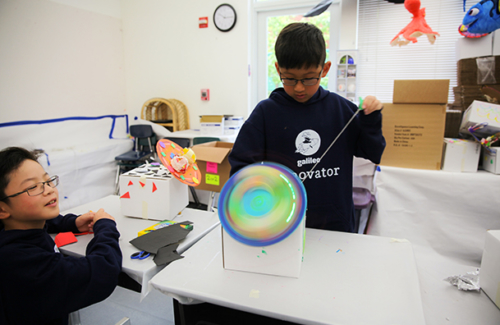FROM SUMMER CAMP TO SCHOOL: HOW TO ENCOURAGE CURIOSITY IN KIDS ALL YEAR LONG

“Old age starts where curiosity ends.” This powerful quote attributed to Pulitzer Prize-winning, Portuguese writer Jose Saramago reminds us of the important role that curiosity plays in our lives. It starts at an early age, propelling us forward through life and fueling our interests and passions. Though initially available in abundant supply, for many of us, curiosity grows more fragile as we get older, and it’s important not to forget that it requires nurturing and preservation. This is an attitude that we must not remember only for ourselves, but one which we must help our kids with as well. So, from summer camp right through the school year, how can we encourage curiosity and a growth mindset in kids and help them to maintain an adequate level all year long?
THE ADVENT OF CURIOSITY
“Curiosity is basically a hunger for exploration,” says researcher Sophie von Stumm of the University of Edinburgh in the UK. With certainty, it is present from birth. Infants’ interest in the human face is evident as they follow the eyes and mouths of their caregivers, responding with enthusiasm and pleasure. As hand-eye coordination develops, their reach increases to allow further exploration. Their growing inquisitiveness parallels increased mobility as their need to know motivates crawling and later walking. Since their curiosity knows no bounds, they need protection from dangers like exploring hot surfaces and tasting hazardous items. It is through their curiosity that kids learn, and it carries them into the school years.
CURIOSITY ACTIVATES LEARNING CENTERS
Researchers at UC Davis have determined that once aroused, curiosity activates centers in the brain that make them more susceptible to learning. This increased susceptibility is not limited to the object of the curiosity but extends to anything learned or experienced during the period of heightened curiosity. So, curiosity, once piqued, makes the brain more receptive to learning in general. It’s an amazing cycle that our minds participate in.
SUPPORTING AND PRESERVING CURIOSITYUnfortunately, curiosity is somewhat fragile and if not nurtured and supported, it can get lost as we grow older. Albert Einstein observed, “Curiosity is a delicate little plant which, aside from stimulation, stands mainly in need of freedom.” But there are simple things we can do to support and help to preserve childhood curiosity.
- Model curiosity through think-alouds: Let kids see you wonder by voicing your questions out loud. Recognize your own interests and verbalize them. Exercising this focus on your own curiosity could be good for both of you.
- Encourage their questions: Sanction kids’ curiosity when questions arise. Avoid quick or terminal responses, like “because I said so” or “I don’t know.” Make room for secondary and follow-up questions and commit to making time to help them find the answers. This can also be an amazing bonding experience. You may not know why the sky is blue, but when your kid asks, you can work together to solve the puzzle.
- Notice their interests: When kids show an interest in something, help them explore it. Maybe they are intrigued by plants, animals or cars. Feeding their interests could have long-term implications, helping them find a hobby or even a future career. Seize the opportunity to help kids develop passions.
- Have a conversation: Teachers often spark interest by starting lessons with a phenomenon or anticipatory set, which primes students for learning. Maintain the momentum outside of school by having meaningful conversations with kids. Ask questions and use real vocabulary as part of your everyday routine. With just a bit of effort, even the most mundane times and tasks can become a learning experience.
- Expand their horizons: Provide plenty of variety to pique kids’ interests, including different types of music, art and food. Visit museums, try a range of games and sports, and make travel a priority. When kids are frequently exposed to new sights, sounds and tastes, their enthusiasm to learn is engaged.

GIVING CURIOSITY A BOOST
Summer camp can provide significant support for kids’ curiosity, particularly when the program is focused on risk-taking and innovation. When camp themes and majors engage their interest in the world through project-based learning, campers have the opportunity for hands-on, minds-on exploration. Camp Galileo empowers them to follow their curiosity and exercise their creativity, thus allowing their ideas to take shape. A summer immersed in active learning, with support from eternally curious and enthusiastic adults can give kids tools and motivation to remain learners for life.
CURIOSITY FOR LIFE
It is easy to see its benefit in the classroom, but is curiosity important beyond the school years? Psychologist and director of the Hungry Mind Lab, Sophie von Stumm says that it is also crucial in the job market. It is easy to hire someone with previous job experience, but in the interest of future development, she urges employers to consider another factor; “it’s far more interesting to identify those people who have the greatest potential for development, i.e. the curious ones.” So there remains a purpose for curiosity in our adult lives, as well. And as Saramago pointed out so provocatively, the loss of curiosity may signal a milestone we are not anxious to observe.
See how curiosity comes to life at Camp Galileo Menlo Park or check out these summer camps in your area that help kids’ curiosity to thrive: San Francisco Bay Area, Southern California, and Chicagoland. Sign up for our mailing list to keep up-to-date on our camp happenings, innovation resources and registration information for our upcoming 2019 camp season.

